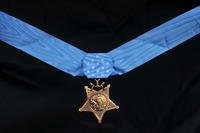At the turn of the 20th century, Louisiana's Cajun people were still growing up speaking their own form of the French language. Today, this history and culture is widely celebrated, but at the time, it was considered a low-class, "back country language," according to author and podcaster Jason Theriot.
Teachers discouraged the language in schools through harsh punishments, causing many young Cajuns to grow up feeling ashamed of their backgrounds. That all changed when the United States called on its French-speaking Louisianans to help win World War II.
The people we know as Cajun came to Louisiana after being expelled from their original home on Canada's east coast, today's provinces of Nova Scotia, New Brunswick and Prince Edward Island. They were also present in what is today the U.S. state of Maine. When the Seven Years' War broke out between France and Britain, it spilled over into North America in 1754 as the French and Indian War.
Believing the French-speaking natives of the area would aid French military operations, Canada's governor forcibly transported them to other colonies or to England and France. Many of French-speaking Canada’s former residents made their way to Louisiana, then controlled by Spain. Like many forced migrations, it killed thousands through hunger and disease.
Those who arrived in Spanish Louisiana would remain, even after the United States took control of the territory. They retained their unique language and culture and are today recognized as a national ethnic group, but the celebration of their identity is a relatively recent development.
When formal schools became compulsory in Louisiana after 1910, Cajun children found themselves being punished for speaking their native language at school, despite the fact that many had never known English before. They found their language and culture suppressed -- until World War II broke out in Europe.
The armed forces and American intelligence services suddenly needed French speakers like they never had before. Theriot told the Acadiana Advocate that Cajuns were being shipped out to regular infantry units and suddenly finding themselves transferred to becoming translators, intelligence officers and liaisons to French resistance cells.
"Twenty-year-old GIs are writing back to their families and friends back home saying, 'Hey, you won't believe, but that language I was told was not useful, that French language that was beat down when I was a kid, has become invaluable. And you wouldn't believe all the wonderful things that have happened to me since I've gotten here,'" said Theriot.
Since completing his master's thesis on the same subject in 2007, Theriot has been working to expand the body of knowledge on this little corner of history to include three books, another in progress and the podcast "Frenchie."
He's interviewed more than 100 Louisiana Cajun veterans in his work, and is constantly looking for more, either in-person or through videos and letters submitted by family members. The podcast, named "Frenchie" after the nickname given to many Cajun troops by their fellow GIs, finds Theriot interviewing some of these veterans in their different roles.
He has also covered the foundations of the “Cajun National Guard,” the 2nd Battalion, 156th Infantry Regiment, the 31st "Dixie" Division, which was the largest French-speaking American infantry unit in World War II. The first episode is a series of interviews with Bob LeBlanc, who landed at Normandy with Gen. George S. Patton's Third Army and was a liaison officer to the Office of Strategic Services (OSS).
Theriot's goal has been to reveal the invaluable contributions made to the war effort from a small subset of Americans, using the thing for which they were once persecuted: their language. Their service restored their cultural pride and has since led to the national embrace of their history and heritage.

Catch the "Frenchie" podcast on Apple Podcasts, Spotify, Audible or wherever you like to listen. To keep up with the latest developments in Theriot's research, visit his website.
-- Blake Stilwell can be reached at blake.stilwell@military.com. He can also be found on Twitter @blakestilwell or on Facebook.
Want to Learn More About Military Life?
Whether you're thinking of joining the military, looking for post-military careers or keeping up with military life and benefits, Military.com has you covered. Subscribe to Military.com to have military news, updates and resources delivered directly to your inbox.















